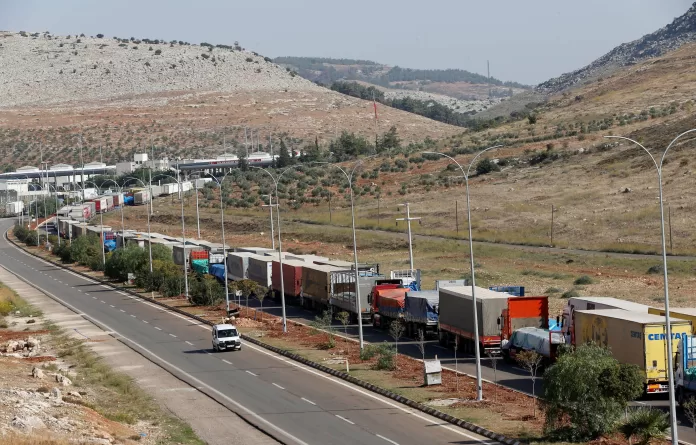After years of being shut out due to international sanctions, Syria is now open for business. The lifting of U.S. sanctions has allowed Turkish companies to explore the chance to help rebuild the war-torn country. For many of these businesses, the move feels like a new beginning—but one that comes with serious challenges.
Turkish Companies Step Into Syria’s Rebuilding Effort
Syria has suffered through 13 years of war, leaving buildings destroyed, roads broken, and factories silent. Rebuilding the nation might cost up to $1 trillion, according to experts. With the new Syrian government in place after a leadership change, the country is looking to attract investment. Turkish companies are among the first to show interest.
Turkey and Syria now share a friendly relationship. Turkish manufacturing, transportation, energy, and construction companies perceive a significant chance to contribute to Syria’s restoration. Businesses are beginning to get orders from Syrian partners, and Turkish exports to Syria have already surged by 37% in the first four months of 2025.
Some of the materials most in demand are machinery, metal, glass, and ceramics. Syrian orders for Turkish machinery have more than tripled. Imports of glass and ceramics have risen by 73%, showing the urgent need for construction materials.
Money Transfers, Taxes, and Infrastructure Cause Worry
Even though the sanctions have been lifted, doing business in Syria is still far from easy. Payments are one of the main issues Turkish businesses deal with. Many Syrian banks are still not fully working. As a result, businesses are using exchange bureaus and brokers to move money. It’s not an easy remedy, but it’s a temporary one.
Tax rules in Syria are also unclear and often difficult to follow. Some Turkish firms say that customs procedures are slow and confusing. The transportation system, including roads and bridges, has been badly damaged, making it hard to move goods from one place to another.
Several Turkish businesses reported significant interest from Syrian consumers at a recent building show in Damascus. However, they also shared concerns about unclear rules, long delays at customs, and poor infrastructure. Some called it a “calculated risk,” showing both excitement and caution about the Syrian market.
Energy Projects, Low-Cost Manufacturing, and Safety Concerns
Turkey is not just exporting materials to Syria. Turkish energy companies are also entering deals to help expand Syria’s power grid. Turkish banks have expressed interest in helping Syria’s banking system once the environment is more stable.
Another area that Turkish companies are exploring is low-cost manufacturing. Syria’s production costs are lower than in Turkey, and some firms see the chance to build factories in Syrian industrial zones. But for this to happen, both countries need to agree on safe and well-organized industrial areas where companies can operate without fear.
Despite the promise, safety remains a top concern. Although major fighting has stopped, weapons are still widespread, and control by the central government is weak in some areas. Turkish companies want to see stronger security and clear systems before making large investments. Some companies are waiting for safer conditions before starting new factories or opening facilities like stone quarries.
Meanwhile, international support is also starting to come in. Rich countries and global donor groups have promised to provide financial help for Syria’s rebuilding. Some countries in the Middle East, including Saudi Arabia and Qatar, have made similar pledges. But for now, most of this support is still just in planning stages.
During the years of war, Syria’s economy experienced a significant decline. Today, more than 90% of Syrians live in poverty. The country’s own government has limited resources. That makes foreign investment and outside help—even from Turkish companies—even more important.
Turkish companies, with their close ties and experience, are in a strong position to contribute to Syria’s recovery. Many have already started sending goods, making deals, and planning bigger projects. But they are also aware that moving too fast in an unstable environment can be dangerous.
In short, Turkish firms are entering Syria with hope but also with open eyes. They see a land full of opportunity, but also full of risk. Although the road ahead is not easy, it is open.


